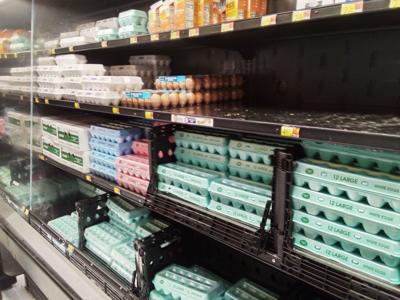According to the USDA, egg prices in the U.S. rose sharply after a major outbreak of viral avian flu in 2022 that caused farms to cull thousands of birds. The outbreak is still affecting the industry, causing record-high egg prices. Those prices seem to have peaked in December.
The USDA reports that 58.24 million birds have been affected over the course of the outbreak. Some states have fared better than others. Iowa was impacted the most by the outbreak, with the USDA reporting 25 total affected commercial flocks and six affected backyard flocks, for a total of 15.95 million birds affected.
Missouri has fared a little better. The USDA reports that eight commercial flocks and 10 backyard flocks were affected, for a total of 478,880 birds affected over the course of the outbreak. Missouri currently has no commercial flocks infected and one backyard flock infected, with 30 total currently affected birds as of print deadlines.
While most states have begun to recover from the outbreak, the loss of thousands of birds is still affecting egg prices.
Those prices are slightly lower than the peak, but are still significantly higher than the norm. In Salem on Feb. 3, a dozen grade A large eggs was selling at Walmart for $3.47, $3.29 at Country Mart, and $3.95 at Dollar General, though Dollar General had no eggs to sell. A carton of 18 large eggs sold for $5.13 at Walmart, $5.79 at Country Mart.
A bird’s eye view of the national average price of eggs shows a concerning trend in egg prices even before the avian flu outbreak. Federal Reserve Economic Data (FRED) shows steady increase in price since 2001, with a few peaks, culminating in a sharp spike in 2022. Prior to 2022, the average price did not break $3. During the economic recession of 2008, the average price of eggs peaked at $2.20.
With prices of regular eggs having skyrocketed, the price of specialty eggs has increased even more. The price of a dozen extra large Eggland’s Best eggs sits at $5.47 at Walmart.
One local egg seller says she’s felt the increased demand. Denise Adams, better known as The Egg Lady through her business, says that she thinks the prices will stay high for a while. She says she’s not raising her prices more than she absolutely has to.
“I don’t want to raise my price,” said Adams. “I can’t stand paying $5 for eggs. I can’t get that.” Adams sometimes takes a load of eggs to Illinois and says that her prices attract a lot of buyers seeking to dodge the supermarket prices.
“I can sell eggs all day,” said Adams.
Adams currently charges $2.50 per dozen, but will soon have to raise her prices slightly. Her flock is free of the bird flu. However, Adams said there are other issues causing the price to go up.
“Feed is $14-something for a 50-pound bag,” said Adams.
Adams said aside from feed and flu, sometimes chickens simply don’t lay. While egg counts often decrease in winter, Adams says she was able to get them to start back up.
“There were four months where they didn’t lay. I started feeding them chicken starter and Quality Egg, and now they are,” she said.
She says her flock of 100 chickens produced 33 eggs a day. Now, she gets one to three eggs.
“I’m not going to worry about it, and take my time,” said Adams. “I’ll put a rooster in with them.”
Adams also says she plans to expand her flock.
“The Jersey Giants, I raised them from babies. They should be laying soon. I’m also getting some new babies soon,” she said.
Though she says her flock hasn’t been hit with the flu, she’s not the only one adding birds. The USDA says prices are likely to stay high while egg-laying populations are replenished.
The USDA’s most recent market outlook says that in 2022, eggs had the highest inflation rate of foods in general at 32.2%. Forecasted production of eggs trends downward to account for the avian flu outbreak, and prices remain high at the moment due to record-high December prices carrying over into 2023.
There may be some relief on the horizon. Wholesale prices are projected to decline further, but the USDA says prices will likely remain high for the time being. However, prices are expected to stabilize as the year progresses to bring the average wholesale price to an estimated $2.05/dozen for 2023.
“While wholesale prices are expected to decline further, they will likely stay elevated as producers rebuild their egg-laying flock capacity,” according to a USDA report. “Based on higher-than-expected December average prices and lower production expectations, the quarterly wholesale egg price forecasts for 2023 are increased as follows: first-quarter to $2.85, second-quarter to $1.95, third quarter to $1.65, and fourth quarter to $1.75 per dozen. This brings the 2023 average forecast prices to $2.05 cents per dozen, almost 27% down from the 2022 average price.”















